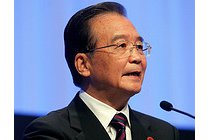Negotiations with an unwavering China limit COP16 progress
Progress in Cancun will be threatened by China’s statement that it will not agree to any deal linking foreign aid to its acceptance of tighter transparency regarding emission reduction efforts.

 Progress in Cancun will be threatened by China's statement that it will not agree to any deal linking foreign aid to its acceptance of tighter transparency regarding emission reduction efforts.
Progress in Cancun will be threatened by China's statement that it will not agree to any deal linking foreign aid to its acceptance of tighter transparency regarding emission reduction efforts.
Huang Huikang, the Chinese Foreign Ministry's special representative for climate change talks, made the remarks on Friday while highlighting a continuing division between China and the US, which has been detrimental to progress in past international talks and threatens advanced negotiations in Cancun.
The International Energy Agency (IEA) reported in July that China has now overtaken the US in terms of energy use. The newly developed country has also been named one of the biggest emitters of greenhouse gases, along with the US. A considerable proportion of this, however, can be attributed to manufacturing of goods that are sold cheaply to Western countries, allowing them to benefit.
Squabbling between the US and China over who should make the biggest cuts, has taken the focus off collaboration from all nations, and it's hoped that agendas can be synchronised in Cancun.
However, Huang said in a news conference that Beijing would not yield on what he said was China's right to make economic growth an overriding priority. "Recently, we've found that some people have always been making a fuss about so-called (emissions) transparency," he said.
Huang voiced that the way to climate negotiations was with advanced nations leading the way with big emissions cuts and guaranteeing more aid and clean technology to help poorer nations.
The overall plan for the upcoming 16th Conference of Parties (COP16) will include a fund to manage aid to poor nations, as well as new ways to share clean technology and a strategy to protect tropical rainforests. The concern from richer nations, though, is that China is not prepared to do its fair share in the battle against global warming, nor willing to shoulder firmer control and cutting of emissions, with tighter international monitoring. China's emissions will continue growing for some time, Huang said, although he did not specify how long this would be.
Huang commented on the "green fund", which continues on from promises made in Copenhagen last year, saying: "These are unconditional and should not be linked to anything else."
The promise in Copenhagen was that wealthier nations would pledge US$10 billion a year from 2010-2012, ramping up to US$100 billion a year starting in 2020. This was also publicised as a way to help developing countries avoid high-carbon pathways of development by adopting lower-emitting power sources such as solar or natural gas. However, a report, published in February 2010, from the International Institute for Environment and Development (IIEA), expresses concern regarding complications of the accord.
Considerations from the IIEA include the complexities of funding, the process of decision-making and whether funding will be provided as a grant or a loan. Such issues are expected to undergo further discussion in Cancun.
Cancun is anticipated as the next step towards making a legally binding deal, reinforcing objectives of the Kyoto Protocol. The final goal will be locking governments into reducing greenhouse gas pollution, although it is recognised that trust and collective ideas are perceived as fundamental towards reaching targets.
Due to its status in tipping the world deeper into global warming, China is fundamental towards an effective decision at the COP16 due to be held in Mexico from 29th November to 10th December. Governments from 192 nations will be present at the talks, anticipating a collective agreement on climate change issues.
Huang said that China's overriding priority will be to develop its economy, eliminate poverty and raise people's welfare. Although some of the agenda from Beijing is in accordance with the US and EU, there appears to be much work to be done to budge the country's inflexible stance on energy consumption and emissions.
Beijing has made a domestic vow to reduce "carbon intensity"- the amount of CO2 emitted per dollar of economic growth-by 40-45 per cent by 2020, however it is unwilling to make a binding agreement. The expectation is to reach an international treaty in Cancun, requiring cooperation from all nations involved, however with China impeding progress on a solid accord, a pivotal goal for Cancun could be limited to the achievement of mild negotiation, potentially facilitating future progress.
Author: Marianna Keen | Climate Action
Image: World Economic Forum/ Flickr






